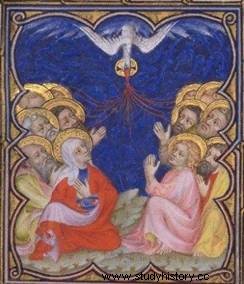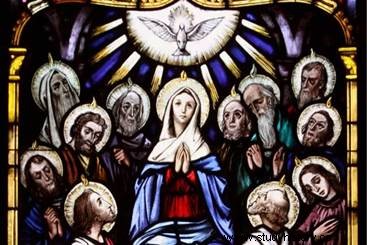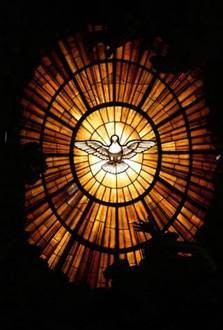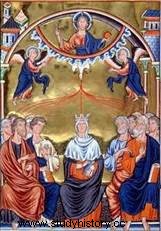 The Feast of Pentecost brings together, with different but related motives, two of the three great monotheisms:Christianity and Judaism . The Christian feast of Pentecost is dedicated to the Holy Spirit , certainly the most enigmatic and the most difficult to define of the persons of the Trinity. Believer or not, it is essential to know the meaning of this highlight of Judeo-Christian culture . A calendar milestone of a common heritage, this holiday is in many countries followed by a non-working or public holiday Monday.
The Feast of Pentecost brings together, with different but related motives, two of the three great monotheisms:Christianity and Judaism . The Christian feast of Pentecost is dedicated to the Holy Spirit , certainly the most enigmatic and the most difficult to define of the persons of the Trinity. Believer or not, it is essential to know the meaning of this highlight of Judeo-Christian culture . A calendar milestone of a common heritage, this holiday is in many countries followed by a non-working or public holiday Monday.
Pentecost, a Jewish holiday
If we generally know Pentecost as a Christian holiday, it should be known that this one is in a way the reformation of a Jewish holiday by Christians who are also in a way Reformed Jews.

This feast of Shavuot (“weeks” in Hebrew) or Pentecost (“fiftieth day” in Greek) takes place 50 days until the day after the seventh Sabbath after the feast of Passover (Jewish Passover). It is originally an agrarian festival linked to the harvest to come (it takes place during plowing). A small part of the barley harvest is sacrificed on the altar in the form of bread (to which are added animal offerings and libations). At the beginning of the 1st century AD, it became one of the three great annual pilgrimages (along with Passover and Sukkot). Little by little the Hellenized Jews and certain Jewish movements linked this holiday commemorating the gift of the Torah to Moses on Sinai (however, this orientation of the holiday would not be made official until the 2nd century by the Pharisees).
It is in this context of the Hebrew feast day that the Christian Pentecost takes place.
Christian Pentecost
The story of the apostles of Jesus of Nazareth is recorded in the book of the Acts of the Apostles, attributed by tradition to the evangelist Saint Luke, a disciple of the apostle Saint- Paul. The latter reports that the apostles after the crucifixion of Jesus saw his resurrection (Easter feast) and saw him go back to God his father (Ascension feast). They then find themselves alone, with the Virgin Mary, when the Jewish feast of Pentecost arrives.
After which, Peter announces to everyone the death and resurrection of Jesus Christ, this is the beginning of the great evangelization movement of the apostles.
The Descent of the Holy Spirit on the Apostles
The Christian Pentecost is therefore intimately linked to the Jewish Pentecost, on the one hand because the first is framed by the second, but also and above all from a thematic point of view . In its Sinaic acceptance, the Jewish holiday marks the beginning of a new covenant with God, appearing in the cloud. Likewise, in the Christian Easter divine intervention in tongues of fire marks the beginning of a new covenant. The Christian Easter is both a culmination and a new beginning.
It is a culmination because the arrival of the Holy Spirit is announced and awaited. According to the Evangelist Saint John, during his last meal Jesus would have announced the arrival of the Holy Spirit who was supposed to come and complete his work with men.
It also says according to Saint-Jean:
Pentecost is the culmination of all this process for which Christ prepares his disciples:he leaves this world without having told and taught everything to men, and the latter are called to deepen their knowledge of God and to evangelize through the Holy Spirit.
But Pentecost is also a starting point since it really launches the kick-off of a great movement of evangelization from the apostles. The new Church is therefore defined by its missionary vocation, but also by its universal vocation since the Holy Spirit gives the apostles the gift of being understood in all languages.
 The Holy Spirit is certainly the least graspable Person of the Trinity in our minds. Much less concrete than the Father or his son Jesus Christ. The word “Spirit” is a translation of the Greek “Pneuma” which literally means “breath”. The Holy Spirit is considered as the third person (hypostasis) of the Trinity since the first council of Nicaea (325) which defines him as consubstantial with the Father and the Son. The Spirit is for Christians an individualized person who, just as he accompanied Christ on earth (calling him to life, attesting that he is the son of God to the apostles...) pushes men to believe , understand, live and spread the gospel. He is the one through whom the Trinity has been active in the world since the Ascension of Christ.
The Holy Spirit is certainly the least graspable Person of the Trinity in our minds. Much less concrete than the Father or his son Jesus Christ. The word “Spirit” is a translation of the Greek “Pneuma” which literally means “breath”. The Holy Spirit is considered as the third person (hypostasis) of the Trinity since the first council of Nicaea (325) which defines him as consubstantial with the Father and the Son. The Spirit is for Christians an individualized person who, just as he accompanied Christ on earth (calling him to life, attesting that he is the son of God to the apostles...) pushes men to believe , understand, live and spread the gospel. He is the one through whom the Trinity has been active in the world since the Ascension of Christ.
The nature of the Holy Spirit is so difficult for Christians to perceive that it was one of the stumbling blocks that led to schism:the Nicene-Constantinople Creed ( written in 325 and completed in 381) considered that the Holy Spirit proceeded from the Father. Against the opinion of the Pope, the Emperor Charlemagne adds that he also proceeds from the Son as affirmed by the Church of Spain. It was only in the second half of the 9th century that Pope Nicolas II accepted this new Creed, which was to be one of the causes of the Great Eastern Schism in 1054 following what was called the Filioque quarrel, the Orthodox believe that this addition is not justified by the Fathers of the Church.
It is also through a search for greater knowledge and greater intimacy with the Holy Spirit that Pentecostal movements have developed since the 20th century. and charismatic that affect both the Catholic and Reformed Churches.
The Feast of Pentecost
It would seem that as early as the 2nd century Christian communities celebrated Pentecost, but the thing did not really become widespread until the 4th century when it is well attested in Italy. It even ended up becoming a feast of obligation under Charlemagne during the Council of Mainz (813).
Even today, this religious holiday is at the heart of the Christian Churches, it is moreover generally this day which is chosen by Catholics for the sacrament of Confirmation. In France, Pentecost Monday was a public holiday which has been transformed into a day of solidarity with people with a loss of autonomy or with disabilities.
To go further
• Simon Claude Mimouno &Pierre Maraval, Christianity from the origins to Constantine, PUF, 2006.
• Philippe Rouillard, Christian Festivals in the West, Les Editions du Cerf, 2006.
